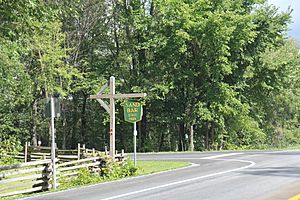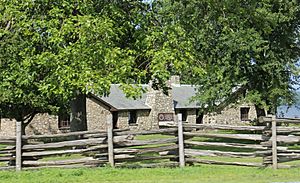Sand Bar State Park facts for kids
Quick facts for kids Sand Bar State Park |
|
|---|---|
| Type | State park |
| Location | 5 Button Bay State Park Rd. Milton, Vermont |
| Area | 15 acres (6.1 ha) |
| Created | 1933 |
| Operated by | Vermont Department of Forests, Parks, and Recreation |
| Status | Open Memorial Day weekend - Labor Day weekend |
| Website | https://vtstateparks.com/sandbar.html |
Sand Bar State Park is a fun place to visit in Milton, Vermont! It's a 15-acre state park right on the edge of beautiful Lake Champlain. This park first opened its doors in 1933, offering a great spot for families to enjoy nature.
Where is Sand Bar State Park?
This park is found on the eastern side of Lake Champlain. It is north of Burlington, which is Vermont's biggest city. The park sits along United States Route 2.
It's at the eastern end of a natural sandbar. This sandbar stretches across the lake. It connects the town of Milton on the Vermont mainland to South Hero Island. Most of this sandbar now has a road built on top of it. This road is US 2.
The park is shaped a bit like a triangle. To its east, you'll find the Sand Bar Wildlife Management Area. This area is also run by the state. Sand Bar Park Road goes north from US 2. This road leads you right into the park.
What Can You Do at the Park?
Sand Bar State Park has lots of cool things to do! There's a sandy beach that's about 2,000 feet long. You can rent canoes and kayaks to explore the water. If you get hungry, there's a food stand.
The park also has picnic tables where you can cook your own food. You can play volleyball or horseshoes. There are even swings for younger visitors. The most famous building in the park is a big stone bathhouse.
This bathhouse was built a long time ago, between 1933 and 1935. It was built by a group called the Civilian Conservation Corps (CCC). People love to swim, boat, and fish here. You can also go hiking, have picnics, or watch for wildlife. Many water sports are popular in the summer. In winter, people enjoy winter sports too!
A Look Back at the Park's History
Sand Bar State Park was Vermont's sixth state park. It was also the first park created on land that the state actually bought. The land was developed in 1933. This happened because of a state law from 1929. That law allowed the state to buy land for parks.
At first, the area was mostly wet, swampy marshland. But then, crews from the CCC came in. They worked hard to clear, fill, and level the land. Besides the bathhouse, the CCC also built a stone grill. This grill is still in the park today!
The top floor of the bathhouse used to be living spaces. Park caretakers and lifeguards lived there. Now, it's used for storage. The rest of the building is still used for its original purpose. It has only been updated with electricity and plumbing. A smaller part of the park, about 4.5 acres around the bathhouse, is very special. It was added to the National Register of Historic Places in 2002. This was because of the important things the CCC built there.
 | Toni Morrison |
 | Barack Obama |
 | Martin Luther King Jr. |
 | Ralph Bunche |



